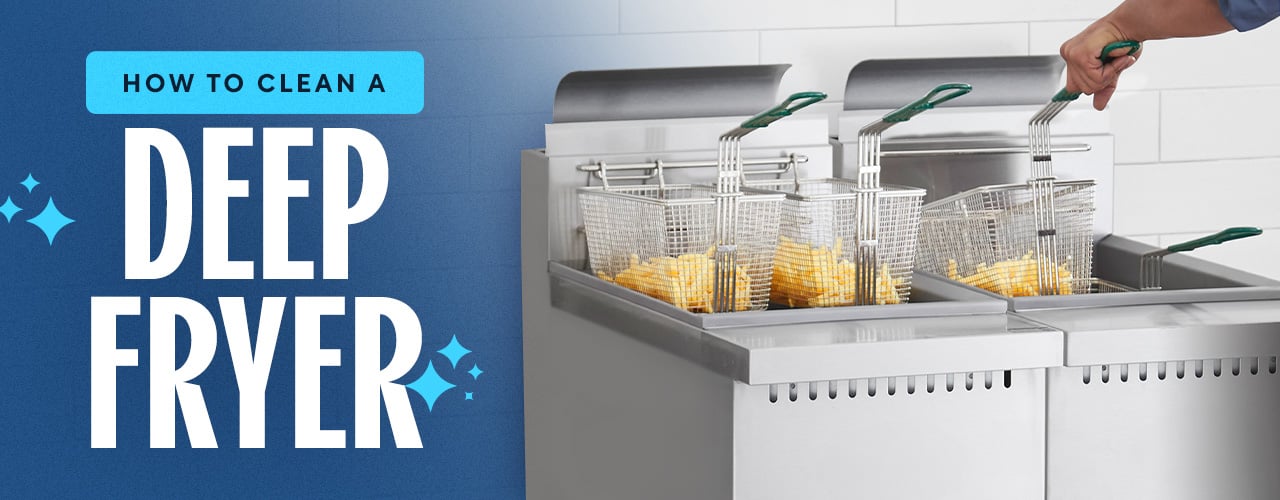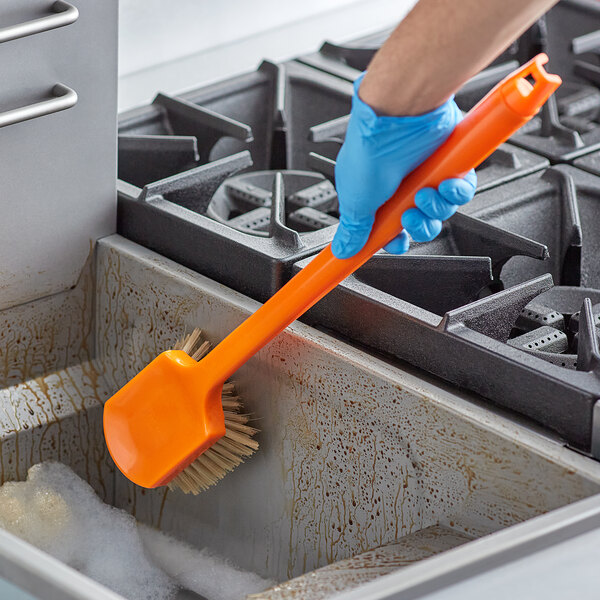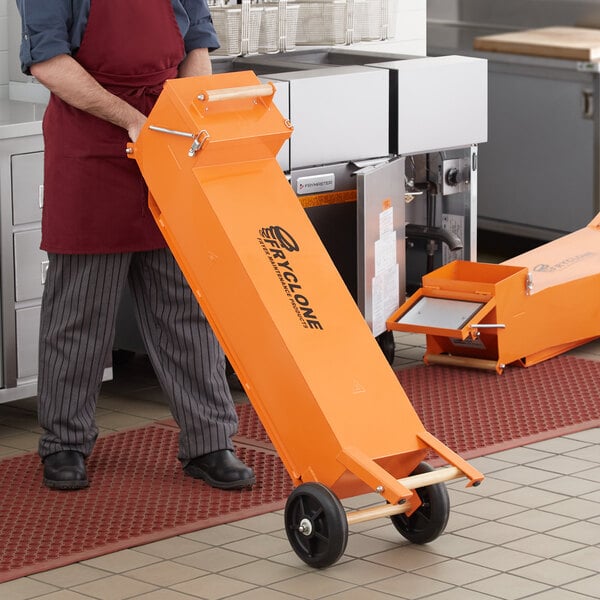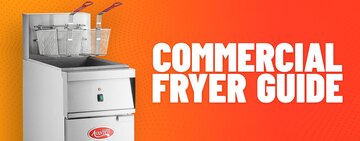
How to Clean a Deep Fryer
Last updated on 12/8/2023Choosing the right oil for your fryer is only part of what makes fried food delicious. Keeping your deep fryer clean and your oil fresh can have a huge impact on the flavor of your appetizers and entrees. We’ll guide you through the step-by-step process of cleaning a deep fryer, including draining and filtering the oil, boiling out the fryer, and disposing of spent grease. By following these simple steps, you can keep your deep fryer in optimal condition and continue to serve delicious fried dishes to your customers.
Shop All Fryer CleanerHow to Boil Out a Deep Fryer
Boiling out a deep fryer is the process of removing old oil, adding water and cleaning solution, and then boiling the water to thoroughly clean the interior of the fryer and remove any hard, stuck-on grime. Follow the steps in the video below to boil out your fryer:
Fryer Boiling Out Instructions
- Drain all of the grease from the fryer and safely discard it via an oil caddy and an approved oil discharge container.
- Use a fryer cleaning rod to clean any remaining debris out of the drain line.
- Rinse the fryer with hot water to remove excess undrained fat.
- Fill the fryer with cool water within at least 3-4" of the top. Then, add your deep-fat fryer cleaner. Check the instructions on the bottle to find the specific amount you need to use.
- Boil slowly for 20 minutes.
- Turn off the fryer and allow the soapy water to cool down.
- Allow the fryer to drain slowly. When the water has drained, use a long-handled fryer brush to clean the sides, top, and heating elements of the fryer.
- Rinse thoroughly to remove all residue.
- Add your new oil. Add fry powder or oil stabilizer to the fresh oil to make it last longer.
Why Should I Boil Out My Deep Fryer?

There are a few benefits to regularly boiling out your commercial deep fryer:
- Reduce Flavor Transfer: Boiling out your deep fryer is an essential step to prevent flavor transfer between different food items. Over time, oils and fats can absorb the flavors of the foods being cooked, resulting in an undesirable taste in subsequent batches. Boiling out the fryer helps remove any residual flavors, ensuring that each batch of fried food maintains its original taste.
- Prolong the Oil's Lifespan: Regularly boiling out your deep fryer can significantly extend the lifespan of the frying oil. As oil is used for frying, it accumulates food particles, debris, and other impurities that can negatively impact its quality. These impurities can cause the oil to break down faster, resulting in a shorter oil lifespan. Boiling out the fryer helps remove these impurities, keeping the oil cleaner for longer and reducing the need for frequent oil changes.
- Reduce Chemicals Needed to Fight Build-up: When a deep fryer is not properly cleaned, a build-up of carbon deposits, grease, and food particles can occur. This build-up can be challenging to remove and may require the use of strong chemical cleaners. Boiling out the fryer regularly helps prevent excessive build-up, reducing the need for harsh chemicals to break it down. By reducing the reliance on chemicals, you can create a safer and more environmentally friendly cleaning routine for your deep fryer.
How Often Should You Boil Out a Fryer?
To keep your fryer in optimal condition, it is recommended to boil out the fryer at least once a week. This helps to maintain its efficiency and ensure the quality of your fried foods. You may need to boil out your unit more frequently depending on how heavily your unit is being used. Follow the manufacturer’s manual for the specific cleaning instructions.
How to Filter Fryer Oil
Filtering fryer oil is an essential step in maintaining the quality and longevity of your fryer. Regularly filtering your fryer oil not only helps remove impurities and extend its lifespan but also ensures that your fried foods consistently turn out crisp and delicious. Invest in a reliable fryer oil filter machine or a filtering system specifically designed for commercial fryers. These machines are equipped with filters that capture even the smallest impurities, ensuring cleaner oil for your frying needs.
Fryer Oil Filtering Instructions
- Make sure to allow the oil to cool down to a safe handling temperature before starting the filtering process. Hot oil can cause severe burns, so it's crucial to exercise caution and wear appropriate protective gear.
- Start by positioning the filter machine near the fryer, ensuring it is stable and secure.
- Place the filter paper or screen inside the machine, following the manufacturer's instructions.
- Carefully pour the cooled oil into the filter machine's reservoir, allowing it to pass through the filter and into a holding container or back into the fryer.
- If filtered into a holding container, you can take the opportunity to clean the fryer thoroughly by boiling it out. Remove any remaining food particles or debris from the fryer's interior, using a fryer brush or other appropriate cleaning tools.
- Return the filtered oil to the fryer with the basin or connection hose.
- After filtering, properly dispose of the collected waste, which may include food particles, crumbs, and other debris. Follow local regulations and guidelines for the safe disposal of used fryer oil waste.
How Often Should You Filter Fryer Oil?
Aim to filter your fryer oil at least once a day, or more frequently if your fryer sees heavy use. Regular filtering helps remove food particles, crumbs, and other debris that can accumulate and affect the oil's quality.
Can I Leave Oil in My Deep Fryer?
While it is best to store oil outside of your fryer when it is not in use for long periods of time, you can leave oil in your deep fryer for short periods. That being said, it is important to first filter the oil to ensure that any food debris does not spoil while in the fryer. Additionally, you should always keep your fryer covered and cool when it is not in use because light and heat are two of the major factors in oil spoiling.
Ideally, you should store your oil in a cool, dark place. Storing filtered oil in an airtight container that does not let in light can help extend the life of your oil and save you money.
How to Dispose of Fryer Oil

Properly disposing of fryer oil is essential for maintaining a clean and safe commercial kitchen. Here are several options for disposing of fryer oil:
- Hire a Grease Collection Service: Consider hiring a professional grease collection service to handle the disposal of your used fryer oil. These services specialize in collecting and recycling used cooking oil, ensuring that it is disposed of in an environmentally friendly manner. They often provide containers for oil storage and can schedule regular pickups according to your kitchen's needs.
- Trash It Appropriately: If you are unable to hire a grease collection service, you can dispose of small amounts of fryer oil in the trash. Transfer it to a sealable, leak-proof container, such as a plastic jug or bottle. Label the container as "used cooking oil" to prevent any accidental mishaps. Let it cool and solidify before placing the container in a sturdy garbage bag. Tie it securely before placing it in the trash.
- Recycle or Donate It: Another eco-friendly option is to recycle or donate your used fryer oil. Some recycling centers accept used cooking oil and convert it into biodiesel fuel. Biodiesel is a renewable energy source that can power vehicles and machinery. Additionally, some local farms or animal shelters may be interested in collecting your used oil for animal feed or other purposes. Contact your local recycling center or nearby farms to inquire about their acceptance policies.
- Do Not Pour Down the Drain: It is crucial to never pour fryer oil down the drain. Oil can solidify and clog pipes, leading to costly plumbing issues. Additionally, it can harm the environment by contaminating water sources. Always opt for one of the above disposal methods instead.
How Often Should You Dispose of Fryer Oil?
Over time, fryer oil can become degraded and less effective at frying. The frequency at which you should dispose of the oil will depend on several factors, including the type of food you are frying and the volume of oil you are using. One indication that it's time to dispose of the oil is if it smokes at lower temperatures than before. Additionally, if the oil has become darker in color, has an off-putting smell, or has a thick and foamy surface, it is likely time to dispose of it. Properly disposing of used fryer oil not only ensures the taste and quality of your fried foods but also helps to maintain the longevity of your fryer.
Back to TopProper cleaning and maintenance of a fryer is crucial for ensuring the efficiency of your kitchen equipment. Regularly removing oil, debris, and carbon buildup helps to prevent flavor transfer and maintain the quality of fried foods. By incorporating these cleaning practices into your routine, you can extend the lifespan of your fryer and continue to produce delicious, crispy fried foods for your commercial establishment. Still having trouble with your fryer? Check out our Pitco fryer troubleshooting guide.






